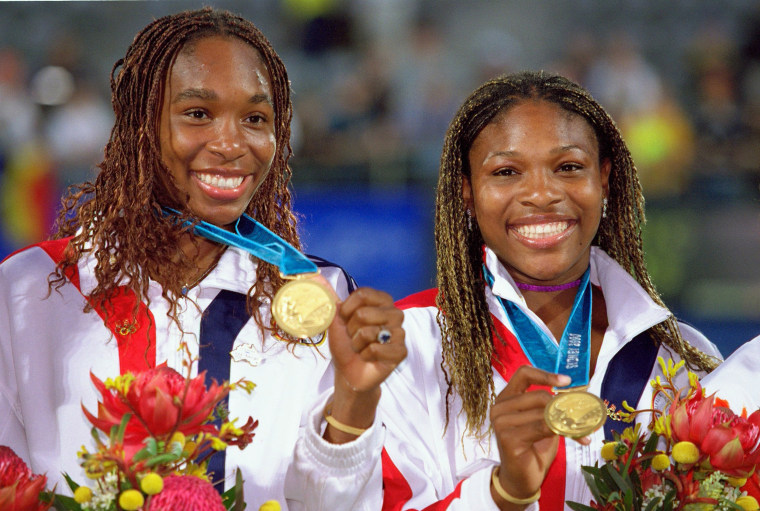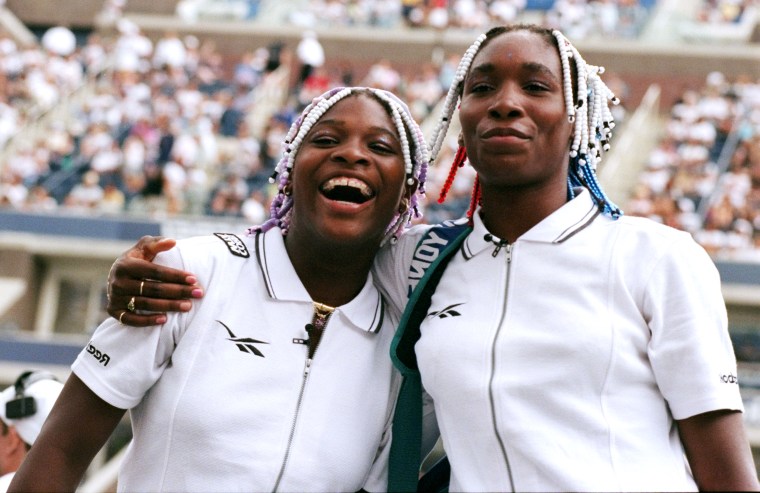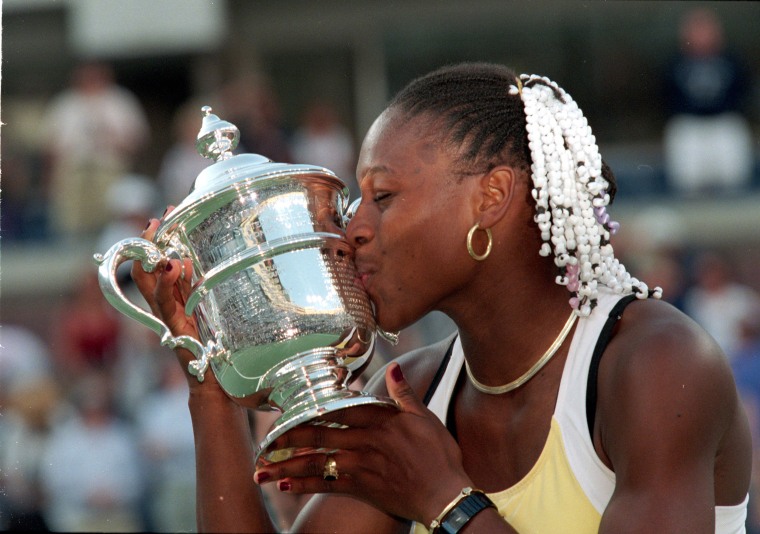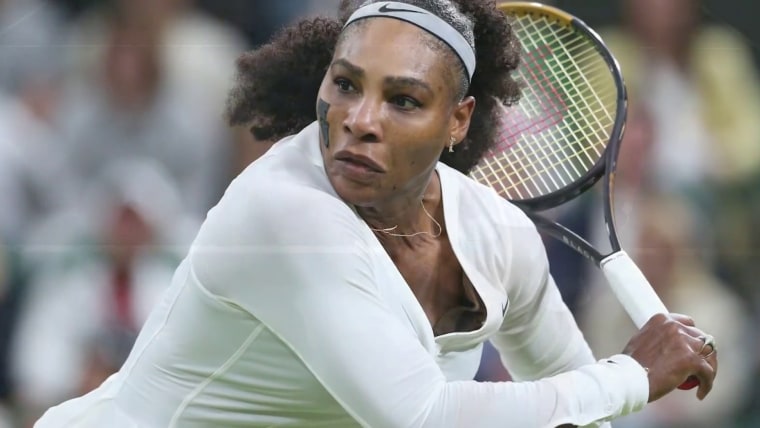When Serena Williams retires from tennis — whether it’s after the upcoming U.S. Open or sometime later — she will leave a legacy as the most dominant and influential women’s player in the game’s history.
Over more than two decades, Serena, who will be 41 next month, used her indomitable spirit to obliterate opponents and record books, earning 23 Grand Slam singles titles among 73 career singles championships. She earned 10 of those major titles after 30 years old, when some players look to retire. She spent 319 weeks as the No. 1 player in the world and returned to the top spot after nearly 15 years — a record. She also won four Olympic gold medals, among other feats.

Those extraordinary numbers aside, though, it is Serena’s inspiring ascension from the mean streets of Compton, California, to becoming one of the greatest in tennis that has made her a pop culture icon and inspired Black girls across the globe to take up the once-exclusive sport.
She and her older sister Venus Williams, another tennis great, burst onto the tennis courts and into Black America’s heart in the mid-1990s, with their no-nonsense father and coach Richard Williams, who directed, cajoled and motivated them. Their father told the world to watch out for Serena after Venus had established herself as the best player in the world. He was right.

Serena played with the grit of her upbringing. Her zeal for the sport resonated with Black America and Black girls in particular, sparking a wave of young talent that rose to the professional level with many picking up the game recreationally.
In her stunning essay in Vogue, in which she intimated she would soon toss aside the racket, Serena wrote that she hadn’t thought about what the lasting impact of her success would be. “I get asked about it a lot, and I never know exactly what to say,” she said. “But I’d like to think that thanks to opportunities afforded to me, women athletes feel that they can be themselves on the court. They can play with aggression and pump their fists. They can be strong yet beautiful.”
Four-time Grand Slam winner Naomi Osaka seems to have followed the path Serena laid.
“Her legacy is more than her being Serena,” Osaka, who is Haitian and Japanese, said to Tennis World magazine in October 2021. “I started playing because of her. I’m sure there’s so many other girls that started playing because of her, so she literally built champions. And I think passing it down is how the newer generations get inspired.”

Kim Bell, a health care executive in Georgia, said that during her 15 years playing tennis in various women’s leagues, there has hardly been a conversation in which Serena’s name has not come up among players.
“Serena is our role model for tennis excellence and beyond,” she said. “Our admiration for her has continually evolved given her winning record, adversity she’s overcome in the process, and now as a mom. We relate to her triumphs and defeats on so many levels, and what she has accomplished transcends the sport we love and will impact Black and brown girls and women forever.”

Serena’s strength and control on the court are powerful. Her reactions have ranged from exploding in profane rage at officials to displaying grace in rare defeat.
Off the court, she carried herself with aplomb, often reflective in her responses to probing questions, and at times, exposing her raw emotions. Neither she nor Venus had a smooth ride to their place atop tennis, though. Criticism abounded — about their appearance, their style of play, their sometimes flamboyant tennis outfits and their outspokenness on racial problems, among other issues.
Yet, Serena remained undeterred. In 2000, she pulled out of the Family Circle Cup in South Carolina in support of the NAACP’s call for a boycott over the Confederate flag flying above the statehouse. The next year, she endured racist jeers at the BNP Paribas Open tournament at the California Indian Wells resort, leaving her in tears in her locker room. She boycotted that event for 14 years.
In 2018, she called out sexism after being deducted a point for smashing her racket in frustration at the U.S. Open; women’s tennis pioneer Billie Jean King lauded her for exposing a “double standard” toward female players.
Serena is also an avid supporter of the Black Lives Matter movement.
Hilary Beard, who wrote “Venus and Serena: Serving From The Hip: 10 Rules for Living, Loving, and Winning,” a 2005 instructional book with the sisters, told NBC News that Serena’s conviction to stand behind social justice issues was a driving force for the tennis star.
Serena transformed the tennis world with her play and conviction, Beard said, despite the obstacles in front of her. “I’m talking about an elite white, exclusive tennis world that attempted to exclude this Black woman. At the time she started, she and Venus were adolescents and young women when they first bore the brunt of the force of the tennis world against them,” the author said.
“They didn’t conform to any expectation of the white tennis world or that elite, exclusive society. Serena stood in her brilliance. She stood in her Black beauty. She stood in her body that did not conform to a European standard of beauty.”

Her path to crafting an important legacy was not without controversy — and pain. Serena was at times petulant during a challenging match, or when losing, overshadowing monumental wins for her victorious opponents. In 2003, she dealt with trauma after the death of her half-sister, Yetunde Price, who was the victim of a drive-by shooting in Compton. She drew criticism for her form-fitting outfits, especially at the 2018 French Open. And she had life-threatening complications during the birth of her daughter, Olympia, that required four surgeries.
“I’ve made a lot of mistakes in my career,” Serena wrote in her essay. “Mistakes are learning experiences, and I embrace those moments. I’m far from perfect, but I have also taken a lot of criticism and I’d like to think that I went through some of the hard times as a professional tennis player so that the next generation could have it easier.”
Those hard times did not derail her. Serena earned more than $94 million in prize money, more than any other women’s player in the game’s history. And she pulled in another $45 million off the court. Serena and Venus’ inspiring story was captured in the critically acclaimed film, “King Richard,” which was nominated for a best picture Academy Award. Will Smith won the best actor in a leading role Oscar for his portrayal of their father.
In Compton, where she was raised, Serena is revered. “I can use one word for Serena Williams as it relates to this community,” Mayor Emma Sharif said. “‘Inspiration.’ She’s proud of where she comes from. And young people who live where she once lived can take a look at her successes and realize that anything is possible for them. And the strong lesson she’s shown is that you have to be willing to face challenges and to fight through those challenges.”

At the height of her profession, Serena did something unique: She gave birth to her daughter, now 4. She wrote in Vogue that focusing on being a parent was one of her motivations in leaving the sport.
“That’s part of the power of her as a role model,” Beard said. “At this point in her life and her career, I’m sure she wants to win her 24th Grand Slam. But I imagine she’s made peace with her tennis legacy. Whether the sportscasters and all the traditional arbiters of the sport agree, the rest of us know: Serena is G.O.A.T. And my guess is that she’s far more concerned about inspiring young women and girls, and especially low income Black and brown ones, and marginalized ones. And maybe especially one called Olympia.”
Follow NBCBLK on Facebook, Twitter and Instagram.
Source: | This article originally belongs to Nbcnews.com










